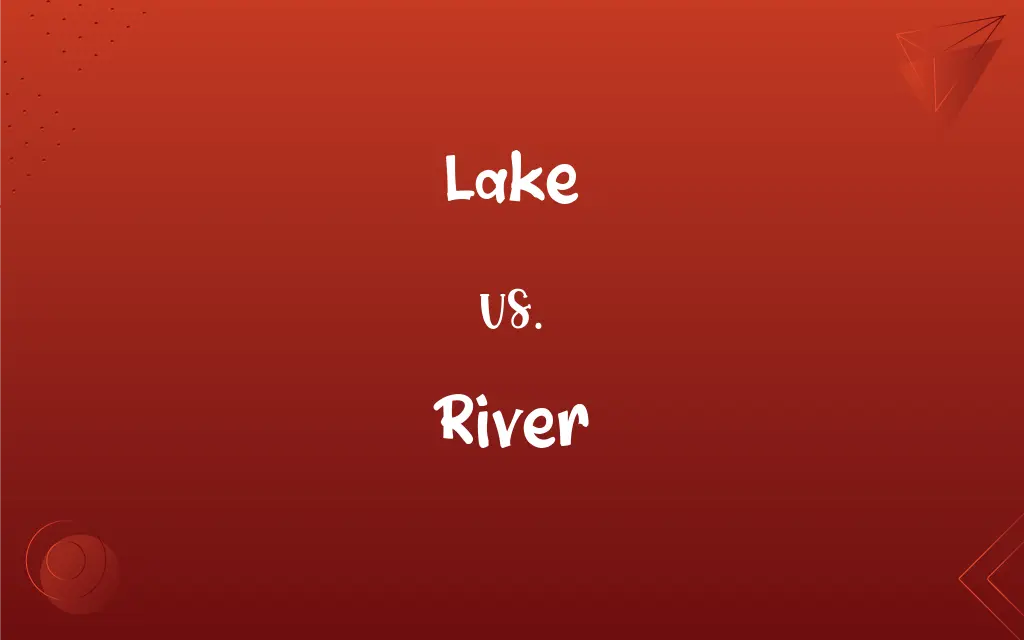Lake vs. River: What's the Difference?
Edited by Janet White || By Harlon Moss || Updated on July 4, 2024
A lake is a sizable body of water surrounded by land, while a river is a flowing watercourse that typically leads to the sea or a lake.

Key Differences
A lake is a body of water of significant size that's completely surrounded by land. Unlike a river, a lake is stagnant in nature, meaning it doesn't flow continuously. Lakes can be found in various geological settings and might be freshwater or saline. In contrast, a river is a naturally flowing watercourse, usually freshwater, flowing towards the sea, a lake, or another river. Rivers move continuously, shaping landscapes as they flow, differing from lakes, which remain in a confined area.
Lakes can be fed by rivers, springs, or other sources. When a river enters a lake, the lake acts as a basin, collecting and storing the water. While rivers transport sediments and water from one place to another, lakes often act as sediment traps, leading to different ecosystems within each water body.
Rivers, on the other hand, play a crucial role in the water cycle by draining water from the land and transporting it to the sea. The continuous movement of rivers, different from the stagnant nature of lakes, means that they're dynamic forces of erosion, carving out valleys and shaping landscapes over time.
Both lakes and rivers are critical freshwater resources. They support diverse ecosystems and have significant cultural, recreational, and economic value. Lakes often serve as reservoirs or sources for drinking water, while rivers can facilitate navigation and trade.
Comparison Chart
Nature of Water
Stagnant
Flowing
ADVERTISEMENT
Formation
Formed in basins due to tectonic activity, glaciation, etc
Formed from runoff and flows due to gravity
Role in Ecosystem
Acts as a basin or reservoir
Transports sediment and nutrients
Connection with Land
Completely surrounded by land
Flows through land, often leading to the sea or a lake
Human Uses
Often used for reservoirs, fishing, and recreation
Used for navigation, power generation, and irrigation
Lake and River Definitions
Lake
A sizable inland body of water.
We spent the weekend by the serene lake.
ADVERTISEMENT
River
A large flowing body of water.
The river wound its way through the valley.
Lake
A pigment used in cosmetics and dyes.
The artist used a lake to achieve the desired shade.
River
A large quantity of a flowing substance.
A river of lava descended from the volcano.
Lake
A reservoir for storing liquid.
The lake held the town's drinking water.
River
A channel through which water flows.
The irrigation river nourished the crops.
Lake
A depression filled with water.
After the rain, a temporary lake formed in the field.
River
A continuous flow or stream of something.
A river of thoughts flooded his mind.
Lake
A reflective, mirror-like surface.
The glass was as smooth as a lake.
River
A groove or channel in a surface.
The sculptor carved a river in the stone to guide the water.
Lake
A large inland body of fresh water or salt water.
River
Abbr. R. A large natural stream of water emptying into an ocean, lake, or other body of water and usually fed along its course by converging tributaries.
FAQs
What is a lake?
A lake is a sizable body of water entirely surrounded by land.
How does a river differ from a lake?
A river is a flowing watercourse, whereas a lake is stagnant and surrounded by land.
Why do rivers flow?
Rivers flow due to gravity, typically moving from higher to lower altitudes.
How deep can a lake get?
Lakes vary in depth, with some like Lake Baikal in Russia reaching over 1,600 meters deep.
Do lakes have a current like rivers?
While lakes are generally stagnant, they can have minor currents caused by wind or inflowing rivers.
How do rivers influence landscapes?
Rivers can erode land, create valleys, and transport sediments, reshaping landscapes over time.
What's the source of rivers?
Rivers can originate from springs, melted snow, or rainfall, often starting in mountains or hills.
Why are rivers important for human civilizations?
Rivers provide water, enable transportation, and have been focal points for settlement and trade throughout history.
Can lakes have outlets?
Yes, lakes can have outlets in the form of rivers or streams that drain them.
What causes the color variations in lakes?
The color can result from minerals, algae, depth, or the surrounding landscape.
Do rivers always flow into the sea?
No, rivers can flow into seas, other rivers, lakes, or even dry up before reaching another body of water.
How are lakes formed?
Lakes can be formed by tectonic activity, glaciation, volcanic activity, or other geological processes.
Can lakes be man-made?
Yes, artificial lakes, often called reservoirs, are created for water storage, power generation, and other purposes.
Are rivers ever stagnant like lakes?
No, rivers flow continuously, though their speed can vary.
How do lakes influence local climates?
Lakes can moderate temperatures, making nearby areas cooler in summer and warmer in winter.
How do rivers affect ecosystems?
Rivers support diverse life, transport nutrients, and create habitats like wetlands.
Which is larger, a lake or a river?
It varies. While some lakes are vast, like the Great Lakes, long rivers like the Nile or Amazon cover more ground.
Which holds more water, a lake or a river?
It depends on the specific lake and river in question, but many of the world's largest lakes hold more water than rivers.
Are all lakes freshwater?
No, some lakes are saline, like the Great Salt Lake in Utah.
Can rivers be man-made?
Yes, man-made channels, often called canals, are created for irrigation, navigation, or drainage.
About Author
Written by
Harlon MossHarlon is a seasoned quality moderator and accomplished content writer for Difference Wiki. An alumnus of the prestigious University of California, he earned his degree in Computer Science. Leveraging his academic background, Harlon brings a meticulous and informed perspective to his work, ensuring content accuracy and excellence.
Edited by
Janet WhiteJanet White has been an esteemed writer and blogger for Difference Wiki. Holding a Master's degree in Science and Medical Journalism from the prestigious Boston University, she has consistently demonstrated her expertise and passion for her field. When she's not immersed in her work, Janet relishes her time exercising, delving into a good book, and cherishing moments with friends and family.































































